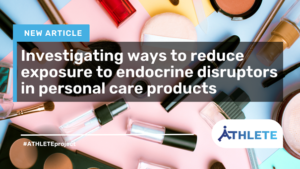An intervention study focusing on reducing women’s exposure to environmental contaminants was recently launched by the French National Institute of Health and Medical Research INSERM, in the framework of the ATHLETE project’s research into the human exposome [1].

The ‘Intervention to Reduce Exposure to Environmental Contaminants’ (IRECO) study aims to investigate whether changes in the types of personal care products (PCPs) could have an impact on exposure to endocrine disrupting chemicals (EDCs) such as phthalates, UV filters, triclosan and parabens. These substances are commonly found in products people may use on a daily basis.
The study runs throughout 2023 and will follow 90 female volunteers who reside in the Grenoble area, France between the ages of 18-30 years old. For a period of five days, the participants will be asked to replace commonly used personal care and cosmetic products with alternatives that do not list the chemicals under investigation on their labels. Repeated urine samples will be collected both before and after these five days. Participants will also be interviewed to determine their knowledge of the chemical substances being measured, their awareness of the chemicals’ presence in personal care and cosmetics products, and the potential health dangers linked to their exposure. The IRECO study hopes to showcase that reducing or changing the use of personal care products can contribute to a decrease in people’s overall chemical body burden.
There have been several studies which have intervened on diet and/or the use of personal care products and monitored concentrations of endocrine disrupting chemicals in urine. Some of these studies are outlined in a recent publication by ATHLETE researchers from the Bradford Teaching Hospitals NHS Foundation Trust (BTHFT), INSERM, NIPH, and ISGlobal [2]. This scoping review highlights that even when organised for only a few days at a time, several interventions were successful in decreasing concentrations of chemicals in urine.
“Our scoping review identified several interventions which were successful in changing individual exposure to endocrine disrupting chemicals of interest. However, to be applied in real life, such interventions require participant motivation and might be limited by the difficulty of identifying safer replacement products”, explains Claire Philippat, researcher at INSERM and co-author of the scoping review.
“This is why policies that reduce or remove harmful endocrine disruptors in manufacturing and processing practices across multiple sectors, rather than individual behaviour change, may have the greatest impact on people’s exposure to these substances.”
The IRECO study is part of ongoing efforts through the EU-funded ATHLETE project to better understand how our environment can impact health from pregnancy to adolescence, and to identify interventions that have a positive impact on health. Outcomes from the ATHLETE project could assist communities and policy makers to make decisions related to minimising chemical exposure and towards improving health outcomes. These go beyond individual changes and have implications for the regulatory reform of EU legislation to reduce exposure to chemicals that impact health.
References:
- Yang, T.C., Jovanovic, N., Chong, F. et al. Interventions to Reduce Exposure to Synthetic Phenols and Phthalates from Dietary Intake and Personal Care Products: a Scoping Review. Curr Envir Health Rpt (2023). https://doi.org/10.1007/s40572-023-00394-8